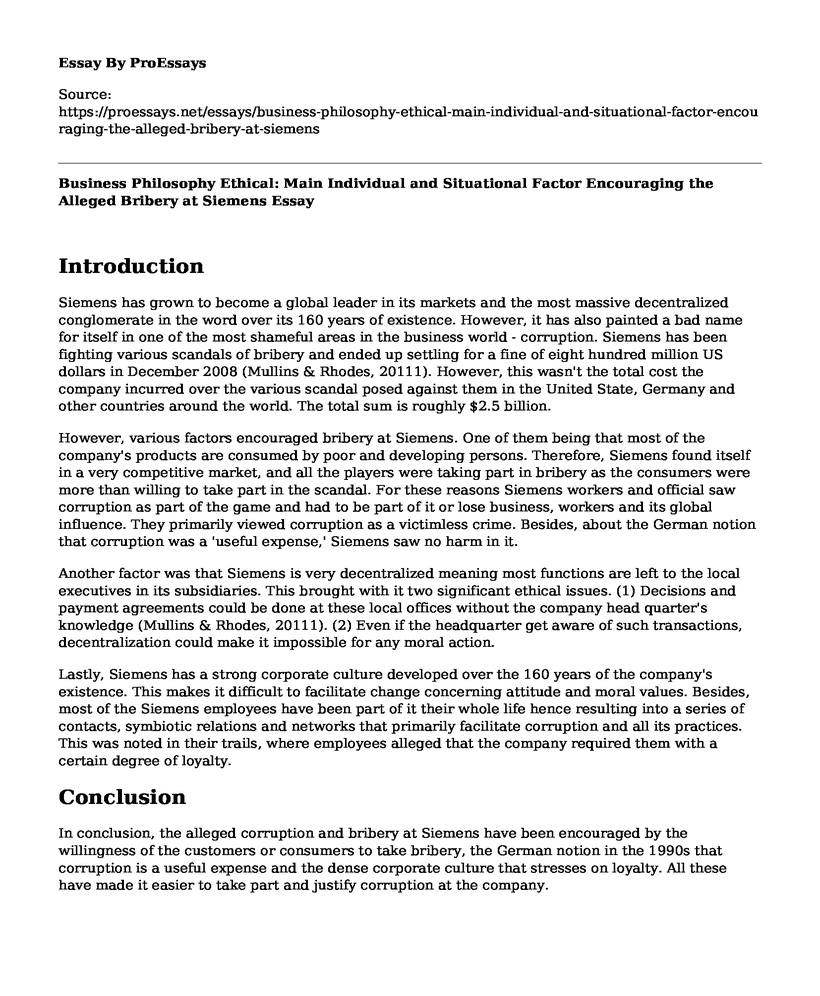Introduction
Siemens has grown to become a global leader in its markets and the most massive decentralized conglomerate in the word over its 160 years of existence. However, it has also painted a bad name for itself in one of the most shameful areas in the business world - corruption. Siemens has been fighting various scandals of bribery and ended up settling for a fine of eight hundred million US dollars in December 2008 (Mullins & Rhodes, 20111). However, this wasn't the total cost the company incurred over the various scandal posed against them in the United State, Germany and other countries around the world. The total sum is roughly $2.5 billion.
However, various factors encouraged bribery at Siemens. One of them being that most of the company's products are consumed by poor and developing persons. Therefore, Siemens found itself in a very competitive market, and all the players were taking part in bribery as the consumers were more than willing to take part in the scandal. For these reasons Siemens workers and official saw corruption as part of the game and had to be part of it or lose business, workers and its global influence. They primarily viewed corruption as a victimless crime. Besides, about the German notion that corruption was a 'useful expense,' Siemens saw no harm in it.
Another factor was that Siemens is very decentralized meaning most functions are left to the local executives in its subsidiaries. This brought with it two significant ethical issues. (1) Decisions and payment agreements could be done at these local offices without the company head quarter's knowledge (Mullins & Rhodes, 20111). (2) Even if the headquarter get aware of such transactions, decentralization could make it impossible for any moral action.
Lastly, Siemens has a strong corporate culture developed over the 160 years of the company's existence. This makes it difficult to facilitate change concerning attitude and moral values. Besides, most of the Siemens employees have been part of it their whole life hence resulting into a series of contacts, symbiotic relations and networks that primarily facilitate corruption and all its practices. This was noted in their trails, where employees alleged that the company required them with a certain degree of loyalty.
Conclusion
In conclusion, the alleged corruption and bribery at Siemens have been encouraged by the willingness of the customers or consumers to take bribery, the German notion in the 1990s that corruption is a useful expense and the dense corporate culture that stresses on loyalty. All these have made it easier to take part and justify corruption at the company.
Reference
Mullins, J., & Rhodes, T. (2011). Managing ethically in corrupt environments. London Business School Review, 22(4), 50-55
Cite this page
Business Philosophy Ethical: Main Individual and Situational Factor Encouraging the Alleged Bribery at Siemens. (2022, Apr 12). Retrieved from https://proessays.net/essays/business-philosophy-ethical-main-individual-and-situational-factor-encouraging-the-alleged-bribery-at-siemens
If you are the original author of this essay and no longer wish to have it published on the ProEssays website, please click below to request its removal:
- The Ultimate Aim of Life Essay
- Ethics in Investment Management Essay
- Aristotle's Tragic Hero: Flawed but Godly Character - Essay Sample
- From Depression to Success: The Inspiring Journey of James Martin - Essay Sample
- Book Analysis Essay on Socrates' Apology
- Essay Example on Morality's Demands: Summary of Scheffler's Article
- Paper Example on Exercising Free Will: Understanding Choices & Consequences







